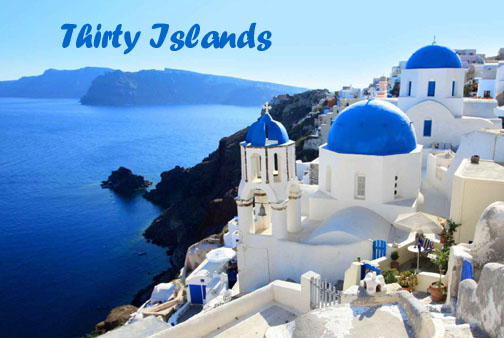

![]()

Vicky:
My ten-second dream guide to the Greek islands.
There are 6000 Greek islands, or more, depending how you count - large, small, inhabited, uninhabited… Not enough lifetimes to love them all.
Here is a toast to about thirty.
HYDRA Picture right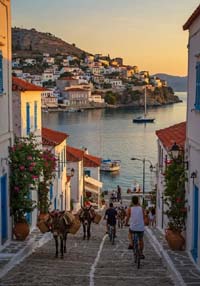
Tiny world with huge character. Like stepping back in time. Leonard Cohen
once lived and wrote his music here; you'll understand why when you come.
Hydra occupies 2 chapters in the novel.
What to Eat:
Thalassina, like fruit de mer, a local dish. Or Octopus
cooked in red wine.
SALAMIS or Salamina
So close to Athens, almost part of it.
Just a round trip in the novel, but the most romantic midnight boat trip
I can think of.
What to Eat:
Psarosoupa, see pictures below, and
you do pronounce the initial P, with fresh lemon or egg-lemon sauce. The
word means fish-soup, but this is no soup as we know it. A filling main
course plate, with chunks of fish and potatoes and celery and so much
else, to last you the rest of the day and overnight. Difficult to find
in summer, but ask for it. Not to confuse with Kakavia,
a very different fish soup with tomatoes, hence red, also a full main
course.
Make sure you dance the Koulouriatikos
with the locals.
ALONISSOS Picture right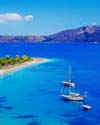
Cocktails on its beaches still tickle my fancy.
What to Eat:
Stuffed squid. Or Okra, with optional chicken, cooked in fresh tomato
and other stuff. A unique texture and taste. Served with feta cheese.
SKOPELOS
A doll's house but not dolled up. Decent and modestly alluring.
What to Eat:
Octopus stifado [stifado is a generic term]. Or Arakas,
peas with various ingredients, a main course in itself, or cooked with
beef.
SKYROS
Dry, but like a good wine.
What to Eat:
Here I had, for breakfast, eggs and crushed tomatoes scrambled together
in a frying pan with olive oil. For dinner, Barbounia (fried
red mullet) with savoro sauce, a difficult sauce to make, with rosemary
and vinegar. Sophisticated and sublime.
SKIATHOS Picture right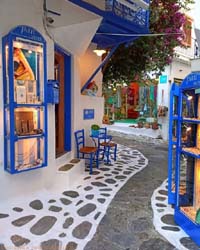
Strangely erotic beaches, too hot for me; I'm a good girl.
Skiathos occupies 3 chapters in the novel.
What to Eat:
Soupies Spanaki - cuttlefish with spinach - a highly individual
taste. Or Kotopoulo lemonato, chicken pieces in lemon sauce.
Or roast whole chicken stuffed with rice and pine-nuts precooked with
chopped tomatoes, onions etc.
Make sure you dance the Kamara with the locals.
THASSOS
Up north. Unique combination of colours. Sand, pine-trees and the sea
all look different, like no place I know.
What to Eat:
Galeos skordalia: I won't tell you what it is because you'll
get the wrong idea - you will not believe the taste. Must be cooked exactly
as the Greeks make it (galeos is a small school shark) or
with a salted cod piece, served with a garlic bread/potato side-dish (skordalia).
Make sure you dance the Orkos and Varis
Syrtos with the locals.
CRETE
Too big for a one-night stand. An entire culture of its own.
Crete occupies 2 chapters in the novel. See chapter 16 for a full-bloodied
appreciation of the picture right.
What to Eat:
Snails stifado [stifado is a generic term]. Or Garides
Pilafi, shrimps cooked with rice in red tomato sauce. Or Kaltsounia,
Diples, Tiropitakia, Spanakopita. You can find everything in Crete.
Make sure you dance the Pendozali and Sousta
with the locals.
IKARIA Picture right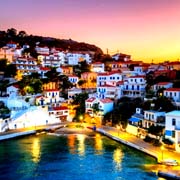
Famous for the longevity of its modern inhabitants now, this is where,
in Greek mythology, Ikarus fell from heaven when his wings melted flying
too high, close to the sun, a lesson for us all, I think. Mine still intact
here on the ground, just.
What to Eat:
Tas Kebab, a hot spicy lamb or veal dish, nothing like its
fast food synonym. Or, as this is an island, Vakalaos Plaki,
cod roasted with onions, tomatoes and parsley in the oven. Anything 'Plaki'
is worth trying - a unique taste.
Make sure you dance the Ikariotikos with the
locals.
KOS Picture right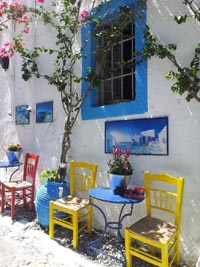
Something here makes the whole night rock. Don't know what it is.
What to Eat:
Pasta with yoghurt, a local dish. Or swordfish souvlaki. Or Giouvarlakia,
rice-and-mince balls, boiled, then served in egg-lemon sauce.
KALYMNOS
Famous for people who die harvesting sponges from the deep. Stories to
fill many nights on a sandy beach round the fire. I never want to sleep.
What to Eat:
Gigandes (butter beans) Plaki (see above)
in the oven. Or Fricasse made with andithia
or lettuce greens, optional with lamb, and egg-lemon sauce.
Make sure you dance the Thimariotikos
with the locals.
RHODES Picture right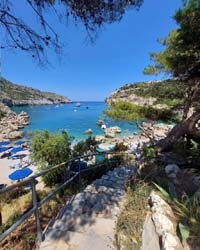
An Aeolian meltemi breeze blew me away. Not as big as Crete but huge character.
Gets even better in winter.
Rhodes occupies 1 chapter in the novel.
What to Eat:
Marida pikandiki, spicy small fry, a local dish. You have
to search hard for traditional Greek tavernas in the main town. Try also
Splinandero, Kokoretsi, Souvlaki and other barbecued meat
delicacies. Or, if you are vegetarian, Cauliflower Giahni
- unbelievable taste - with crusty bread and optional feta cheese. (Giahni
is a generic term for a particular kind of cooking. The word contains
two sounds with no exact equivalent in English. The G is more like a Y
in yours, and you do pronounce the middle H, as in hound. Stress on the
last syllable.)
Make sure you dance the Pidihtos Rodou with
the locals.
NAXOS Picture right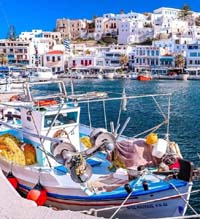
Harbours dark secrets, but I won't tell.
Naxos occupies 1 chapter in the novel.
What to Eat:
Stuffed kid. Then for afters, ice cream Ekmek, there is
nothing like it.
Make sure you dance the Vlacha and Kalamathianos
(not to be confused with mainland Kalamatianos) with the
locals.
ANDROS
I think the name means manly. More Greek character than you can handle
but nothing is too manly for me.
What to Eat:
Fried courgette flowers, a local dish. Or Soutzoukia (spicy
meatballs in a red sauce.) Or Bourekia.
CORFU, or KERKYRA in Greek
Picture right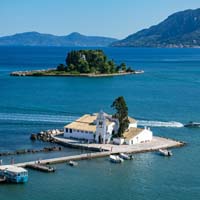
Proper English in summer, with beauty spots on both cheeks, shallow swimming
waters, etc… Get the party started before I come again.
Corfu occupies 2 chapters in the novel.
What to Eat:
Bourtheto, a local mixed fish dish. Or Pork cooked with
celery, or leaks or cabbage.
Make sure you dance the Peratsada-Rouga with
the locals.
MYKONOS
A lot to get your teeth into, too much for one mouth. Bring two, but leave
me out of this. I'm trying to lose weight.
What to Eat:
Onion Pie, a local dish. Or Lamb cooked in a pot with lemon and butter.
LESBOS also called Mytilini, after its
capital.
Not for vegetarians. History forbids. This is where Aristotle began close-up
zoological investigations.
What to Eat:
Filianoi Dolmades made with onions, a local dish. Dolmades
come in many varieties in Greece. In vine leaves they are a fundamentally
different dish to cabbage-leaf dolmades, and the optional egg-lemon sauce
changes vine-leaf dolmades to something different again.
Make sure you dance the Mazomenos with the
locals.
CHIOS
Traditional houses, forgotten past histories, indomitable women, and very
close to Turkey but just geographically.
What to Eat:
Cabbage with mince, a local dish. Or Fakes (red lentil soup
- picture below) so thick, it is a main course, served alone or with fried
potato slices, olives, anchovies, etc., or with crusty bread, wonderful
in winter.
Make sure you dance the Pyrgousikos with the
locals.

SAMOS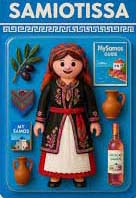
Famous for its red wine but I can't remember myself. Girls with black
eyes and plenty of beauty spots. Look up the famous song Samiotisa.
What to Eat:
Yiorti, a two-meat local dish, pork and goat. Or Revithia,
picture above, a white chick-pea soup, also a main course in itself, served
with fresh lemon juice and, if you can find it, proper Greek village bread
(Horiatiko).
Make sure you dance the Abas with the locals.
LEMNOS
This is where the god Hephaistos married Aphrodite. I say married, but
she probably didn't.
What to Eat:
Artichokes with egg-lemon sauce, optional with butter beans or lamb. Or
artichokes Ala Polita, different again.
Make sure you dance the Kehayias and Patima
with the locals.
AMORGOS Picture right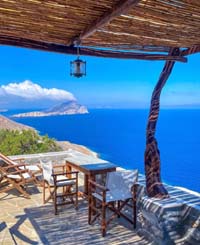
John tells me he knows someone from Amorgos. I won't ask. I've never been
there, so I put that in.
What to Eat:
Don't know the local dish. Try the ultimate traditional Greek Renga
(smoked herring) with Fasolada, picture above, a thick red
bean soup, a winter dish good enough to resurrect the dead, the main course,
whereas Renga is the sidedish.
SYMI Picture below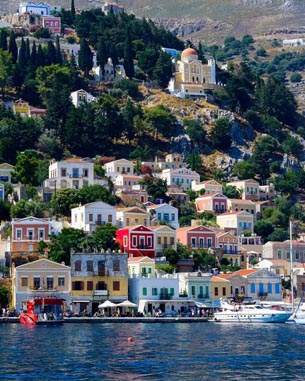
A famous Englishman had a house here - my favourite TV chef. Not seen
him there so far. Next trip, probably.
What to Eat:
Ambelofasoula, Radikia or Vlitta with fresh squeezed lemon,
served with feta cheese and fried potatoes. Rick Stein says the Greeks
make the best chips in the world. You have to eat them to know what he
means.
SIFNOS
Romantic isolation; attracts a different kind of visitor.
What to Eat:
Time for another Greek classic: Stuffed tomatoes, peppers and aubergines
in the oven. All stuffed with the same mixture but each ends up a totally
different taste. What is more, there is yet another dish, stuffed courgettes,
which is totally different again, cooked in a saucepan this time, with
egg-lemon sauce and a very different experience. Food that becomes art
in its subtlety, with meaning, makes you glad to be living.
SERIFOS
Dazzling white houses tumbling down.
What to Eat:
Giouvetsi, a rice-like pasta cooked with lamb in a clay
pot in the oven. Or, as this is an island, fried Kalamarakia
(squid) and Gavros.
MILOS Picture right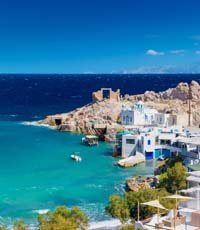
Guess where the Paris Louvre got its Venus de Milo from,
its biggest treasure. This is the thing about Greek islands, so lowly,
humble, calm, simple, but great riches hiding underneath.
What to Eat:
Time for Moussakas, but the authentic dish is hard to find
in popular tourist restaurants because it is so time consuming. Expensive
and complicated ingredients to make it right. Each ingredient, from aubergines
to mince, to the béchamel cream, (no potatoes, please) must be
cooked separately before putting all the layers together and into the
oven. Find a Greek lover with time on his/her hands to cook it for you.
Takes a whole day to make, for a few portions.
PAROS Picture right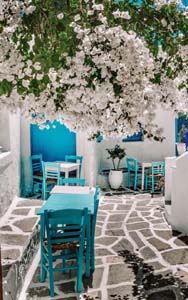
I know a secret little house there I want to buy, one day, maybe. Love
the tiny airport on an island where everything is so laid back. I became
a different woman minutes after reaching the town.
What to Eat:
Roast snails, a local dish. Or Fava, a yellow pea puree
eaten with bread as a main dish, mainly in winter. Or any fresh fish grilled
on coals.
TINOS
Avoid August, when the big Virgin Mary festival brings multitudes, unless
you too hope for a miracle. If you do, it will be granted, without doubt.
I speak from personal experience.
What to Eat:
Another national dish, Pastichio. Looks like Moussakas but
a pasta dish, almost as complicated to make, but just as nice. Or Spanakoriso,
spinach cooked with rice, served with fresh lemon.
SANTORINI Picture right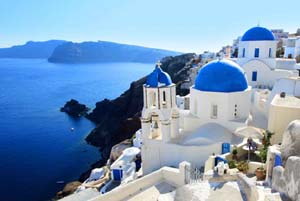
Dark, volcanic, a magical town overlooking the volcano bay with unique
sunset views famous world-wide. Best sunsets in the world.
Santorini occupies 2 chapters in the novel.
What to Eat:
Tomato Balls, a local dish. Or Papoutsakia, aubergines cut
in half and topped with lovely things including melting cheese, baked
in the oven.
LEFKAS or Lefkada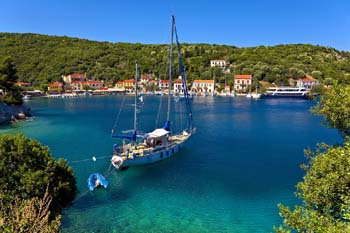
Sail the Ionian sea without fear of stormy winds in the summer.
What to Eat:
Lagos stifado [stifado is a generic term], rabbit
cooked with shallots and rosemary - a classic Greek dish.
Make sure you dance the Milia with the locals.
SPETSES
They say only classy clientele holiday here. Out of my league, then.
What to Eat:
Fish a la Spetsiota, or stuffed sea urchins, both local
dishes. Or Briam, an oven dish mainly with cutup courgettes
and other vegetables, baked with fresh crushed tomatoes.
KYTHIRA Picture
right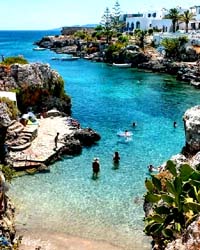
Small ones are more loveable, so I am told. No chance then… I suppose.
Personally, I like big brains.
What to Eat:
Ouzeri stuff: Olives served with wooden toothpicks, pieces
of octopus served in oil and vinegar, Keftedes [with minced
beef, but to call them burgers would be philistine], with fried courgette
and aubergine slices, and other small mezedes to nibble the night
away till time for bed.
Make sure you dance the Bourdaris or Palaikos
with the locals, but this tiny island has invented more traditional dances
than it has inhabitants.
CEFALLONIA or Kefallonia, and ZANTE
or Zakynthos in Greek
We sail past these two Ionian islands in very dramatic times in the novel.
Something comes to mind: "We shall not cease from exploration…"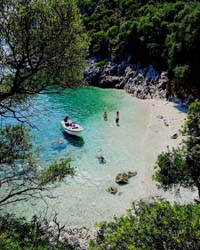
ITHACA Picture
right
"…And the end of all our exploring
Will be to arrive where we started
And know the place for the first time."
Poem by T.S.Eliot.
I told you I like brains.
Ithaca occupies the last chapter in the novel.
Magical, indescribable, treasure it forever.
You will not forget you've been there.
Promise.
Vicky
